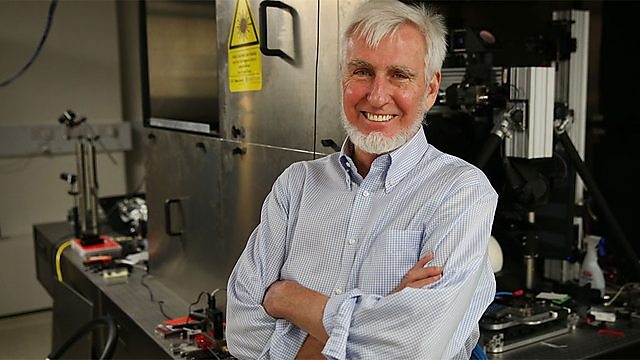
Nobel Prize, Ebola predictions, Genetics and Diabetes
Nobel Prize winners for science. Forecast that the number of Ebola cases could reach 1.4 million people by January 2015.
Nobel Prize
This year’s Nobel Prize winners have been announced. Professor John O’Keefe of UCL shared the Nobel Prize for Physiology or Medicine for the discovery n 1971 of systems in the brain that tell us where we are. He talks to us about his journey to this discovery. The next award was for advancements in Physics and was given to three Japanese Professors, Isamu Akasaki, Hiorshi Amano and Shuji Nakamura who developed blue LEDs in the 1990s. Professor Sir Colin Humphreys from the University of Cambridge comments on their achievement. Finally, the Nobel Prize for Chemistry was split between three scientists, Dr Eric Betzig, Professor Stefan W. Hell and Professor William Moerner. They surpassed the limits of optical microscopy by developing super-resolved fluorescence technology.
Ebola predictions
The Centres for Disease control in the United States recently forecast that the number of Ebola cases could reach 1.4 million people by January 2015. How are estimates like this reached and are they accurate or useful? Claudia talks to Jimmy Whitworth from the Wellcome Trust in London and Adam Kurchaski from the London School of Hygiene and Tropical medicine.
Slo Mo Guys
The Slo Mo Guys are an example of how YouTube stars have become more popular than some mainstream celebrities. Their short, five minute videos have garnered millions of views. Gareth Mitchell volunteers for one of their projects to be smacked in the head with a football filled with water – with startling results when filmed with a high-end slow motion camera.
Genetics and Diabetes
Type 2 diabetes is globally the fastest growing chronic disease. The World Health Organisation estimates more than 300 million people are currently afflicted, rising to more than half a billion by 2030. It might seem on the surface to be a disease with a simple cause – eat too much & exercise too little – and the basic foundation is a relative lack of the hormone insulin. But as with most illnesses, it’s much more complicated, not least because a large number of disease processes are happening all at once. In 2010, a particular gene variant was associated with around 40% of Type 2 diabetics – not directly causal, but this so-called ‘risk variant’ increases the chance of developing the condition if you have the wrong lifestyle. Research published in the journal Science Translational Medicine this week identifies a drug called yohimbine as a potential treatment to help Type 2 diabetics, one that targets this specific genetic make-up.
Patients Doing It for Themselves
Science journalist Vivienne Parry explores how patients are taking control of their own treatment - and asks if people should be allowed to experiment with procedures that might kill them
Burkina Faso Radio
Can health messages delivered by mass media help improve health of a country? The BBC’s Tamasin Ford reports from villages around Burkina Faso about a radio campaign that’s helping to reduce their child mortality rate.
(Photo caption: Nobel Prize winner Professor John O'Keefe stands in his laboratory at University College London on October 6, 2014 in London, England © Peter Macdiarmid/Getty Images)
Last on
More episodes
Previous
Chapters
-
Nobel Prizes 2014
The 2014 Nobel Prizes for Physiology or Medicine, Physics and Chemistry are awarded
Duration: 10:55
Predicting Ebola
How accurate are forecasts for the spread of Ebola?
Duration: 06:38
Slo Mo Guys
Slo Mo Guys throw a ball at Click presenter Gareth Mitchell
Duration: 06:57
Type 2 Diabetes
Lifestyle and treatments.
Duration: 04:49
Patients Doing It for Themselves
How patients are taking control of their own treatment and their own clinical trials
Duration: 09:40
Radio health & Burkina Faso
Can the humble radio save lives?
Duration: 09:51
Broadcast
- Sun 12 Oct 2014 17:05GMTBBC World Service Online
Podcast
-
![]()
Unexpected Elements
The news you know, the science you don't

